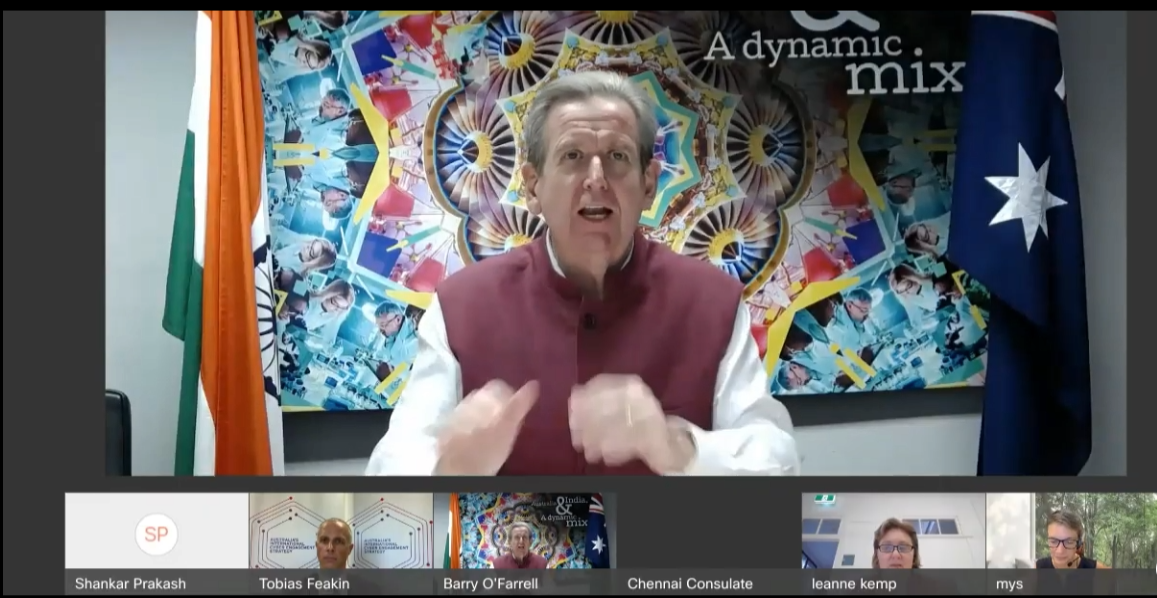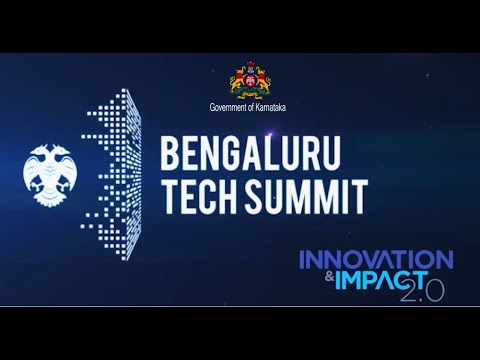Australia Partners with Karnataka to Boost Innovation Opportunities from Cyberspace to Outerspace
Bengaluru NFAPost: Karnataka (the southern state of India) and Australia have entered a strategic partnership to nurture innovation and build new business opportunities from Cyberspace to Outerspace in a post-Covid-19 world.
Opening today’s session at the event of Global Innovation Alliance, Mr. Michael Costa (Deputy Consulate General of Australia) spoke about how Australia is committed to achieving this feat of becoming India’s ideal partner by strengthening Science and Technology collaboration and bringing together its strongest ever presence at the Bengaluru Tech Summit 2020.

Mr. Barry O’ Farrell – Honourable Minister for Trade (Australian High Commission) in his keynote address thanked the Govt. of Karnataka for presenting this wonderful opportunity to share his thoughts at Asia’s largest tech event. He also thanked the various Australian ministries in the esteemed panel for their presence in today’s event.
Australia’s Strategic Partnership with Karnataka (India)
“Australia is a nation of innovators and inventors responsible for the Black Box, Wi-Fi and the technology behind Google Maps. And we continue to make pioneering advances in Cybersecurity, artificial intelligence, quantum computing and 5G, besides the policy frameworks governing these,” said Mr. Barry O’ Farrell while also stressing that the Covid-19 pandemic has highlighted the importance of technology to the world.
He also pointed out that working and innovating with countries which have like-minded people is the key to a safe, secure and prosperous future for our citizens.
“India is one of our closest partners on science, technology and innovation. We share a vision of an open and resilient global technology marketplace and we both want democratic norms and ethics to remain in the core of next-gen technological advances,” he explains.
“Cybersecurity, emerging technologies and critical minerals are the key focus of this global innovation alliance,” Mr. Farrell reiterated.
Ms. Karen Andrewe, Australian Minister for Science and Technology, highlighted her perspective by saying that India and Australia are great believers in technology and have a lot to gain in joining hands to develop the best ideas for both the nations.
She sounded upbeat about accomplishing the fruits of this partnership as they have taken the first step with the launch of this virtual event, despite the hassles posed by the Covid-19 pandemic.
Elaborating on the theme of the event – Next Is Now, she explains that the two countries have laid out solid plans for a strategic partnership in key tech domains from Cyberspace through Outerspace.
“Covid-19 has undoubtedly highlighted the importance of integrating science and technology while connecting together for innovation and peace. Besides, being at the cutting edge of digital advancements and skills development is essential for the success of modern economies,” Ms. Karen adds.
Key Objectives of Australia’s Grand Alliance with India
She also clarifies the main objective of this innovation alliance with India:
“Our aim is to project Australia as the leading digital economy by 2030. Our government is investing almost $800m to improve our businesses to improve their digital capacity. Upgrading Cybersecurity and online skills are particularly important for SMEs which comprise 98% of all Australian businesses.”
Ms. Karen also points out that as part of the Cybersecurity Strategy 2020, Australia is helping to build cyber career pathways and create jobs for an additional 17,000 (from a base of 20,500) cyber professionals across the economy to 2026.
Apart from job creation, she adds that the Australian government is keen on addressing the rising cybersecurity threats in collaboration with international partners like India as it will help in effectively monitoring and responding to these issues while gaining from the shared lessons.
Ms. Karen also mentions the various investment projects undertaken by the Australian government in the field of Artificial Intelligence, Blockchain technology, Quantum Computing, and critical minerals to reduce compliance costs as well as encourage wider adoption of emerging technologies.
“Following the virtual leader summit between Prime Ministers Scott Morrison and Narendra Modi on the 4th of June this year, I announced that $15m would go to extending the Australia-India Strategic Research Fund for another four years. The fund is the Australian Government’s largest bilateral Science program with a total commitment now of $100m since 2006,” she adds.
Ms. Karen also elaborates that the funds will enable strategically-focused leading edge Science and Technology projects, besides nurturing long term alliances between the two countries’ research institutes and encouraging innovative businesses.
Highlighting significant opportunities of this grand alliance with India, she mentions a slew of technologies including earth observation and data analytics, robotics and space life sciences which are expected to largely benefit from this collaboration.
“The sky is the limit… Our collaboration and friendship will only grow in the future,” Ms. Karen concludes.
Mr. C.N. Aswath Narayan, Deputy Chief Minister of Karnataka, spoke about the long-standing strategic relationship between India and Australia which began in 2009.
“It is a matter of pride that Karnataka has been identified as a state for Australia as a part of India – Australia economic strategy 2035. Bilateral and high level delegation visits between Karnataka have paved the way for a deep technology and innovation partnership,” Mr. Aswath explained.
Mr. Aswath also highlighted various programs like Victoria – India Govt. Exchange program which has strengthened the ties between the two countries while also nurturing a beneficial ecosystem on both the sides.
Following the keynote address from the eminent leaders of the two countries the expert panelists further discussed Australia’s international cyber engagement strategy.
Dr Tobias Feakin (Ambassador for Cyber Affairs in Critical Technology) also briefed about the emerging challenges like how cybercrimes have evolved in the aftermath of Covid-19 pandemic and the ways to address them with a collaborative effort between India and Australia.
“We recognise strong linkages between cyberspace, critical technology and geopolitics and geo-strategic competition. Recognising that, we are redeveloping our approach to international cyberspace and critical engagements,” Dr Tobias added.
Prof. Michelle Simons (multi-award winning quantum physicist) spoke about her work while highlighting how her collaboration with IISc has supported advances in quantum computing. She also elaborated on the applications of quantum technology and potential risks that will have to mitigate in the post Covid-19 world.
Ms. Leanne Kemp – Chief Entrepreneur (Govt. of Queensland) highlighted the use of blockchain technology to track high value assets such as diamonds and wine.
She also elaborated about Australia’s startup ecosystem and prevailing opportunities in Queensland for incubation, collaboration and investment, besides highlighting the blockchain capabilities on the company’s tech platform for nurturing international business partnerships with trust and reliability.
Mr. Gavin Standon – Partner System Executive (Telstra) offered an overview of Telstra’s global partner ecosystem and how the company has adapted to the new normal in the post Covid world and how their technology collaboration with Bengaluru is poised to have a global impact.
“It gives me great pleasure to share what Telstra has achieved by leveraging what we have come to in India and specifically in Bengaluru. Telstra is a global telecommunications and technology company based in Australia with revenues of around $27 billion. It commands significant market shares across all customer segments with operating bases spread across 20 different countries globally,” Mr. Standon said.
“The key vision for Telstra is to build a digitally connected future so that everyone can thrive. And that becomes our epicentre around what we drive our innovation,” he added.
Mr. Standon also pointed out that with deeply connected roots in India; Telstra strives to build innovative assets in the subcontinent, particularly Bengaluru which is the hub of Telstra’s state-of-the-art innovation centre. He also added that Telstra has worked extensively to build a safe home-office ecosystem, during the pandemic.





